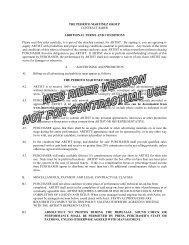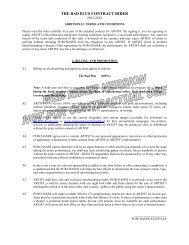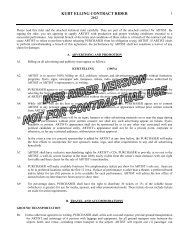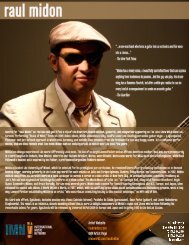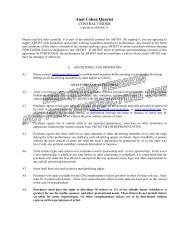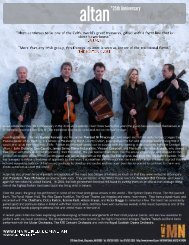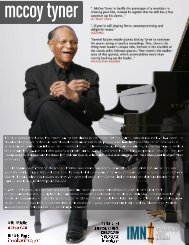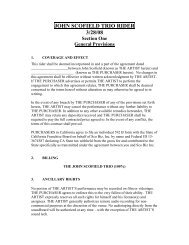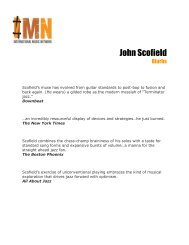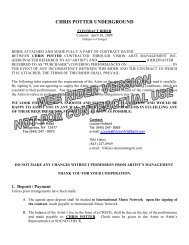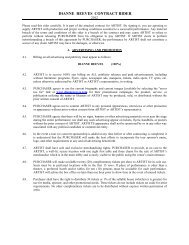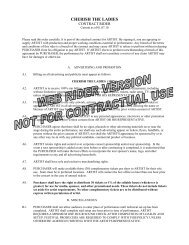Brad Mehldau
Brad Mehldau
Brad Mehldau
- No tags were found...
You also want an ePaper? Increase the reach of your titles
YUMPU automatically turns print PDFs into web optimized ePapers that Google loves.
BRAD MEHLDAUBiography2008Jazz pianist <strong>Brad</strong> <strong>Mehldau</strong> has recorded and performed extensively since the early 1990s. <strong>Mehldau</strong>’s mostconsistent output over the years has taken place in the trio format. Starting in 1996, his group released aseries of five records on Warner Bros. entitled The Art of the Trio. <strong>Mehldau</strong> also has a solo piano recordingentitled Elegiac Cycle, and a record called Places that includes both solo piano and trio songs. ElegiacCycle and Places might be called “concept” albums. They are made up exclusively of original material andhave central themes that hover over the compositions. Other <strong>Mehldau</strong> recordings include Largo, acollaborative effort with the innovative musician and producer Jon Brion, and Anything Goes—a trio outingwith bassist Larry Grenadier and drummer Jorge Rossy.His first record for Nonesuch, <strong>Brad</strong> <strong>Mehldau</strong> Live in Tokyo, was released in September 2004. After tenrewarding years with Rossy playing in <strong>Mehldau</strong>’s regular trio, drummer Jeff Ballard joined the band in2005. The label released its first album from the <strong>Brad</strong> <strong>Mehldau</strong> Trio—Day is Done—on September 27,2005. An exciting double live trio recording entitled <strong>Brad</strong> <strong>Mehldau</strong> Trio Live was released on March 25 th ,2008 (Nonesuch) to critical acclaim.<strong>Mehldau</strong>’s musical personality forms a dichotomy. He is first and foremost an improviser, and greatlycherishes the surprise and wonder that can occur from a spontaneous musical idea that is expresseddirectly, in real time. But he also has a deep fascination for the formal architecture of music, and itinforms everything he plays. In his most inspired playing, the actual structure of his musical thoughtserves as an expressive device. As he plays, he listens to how ideas unwind, and the order in which theyreveal themselves. Each tune has a strongly felt narrative arch, whether it expresses itself in a beginning,an end, or something left intentionally open-ended. The two sides of <strong>Mehldau</strong>’s personality—theimproviser and the formalist—play off each other, and the effect is often something like controlled chaos.<strong>Mehldau</strong> has performed around the world at a steady pace since the mid-1990s, with his trio and as a solopianist. His performances convey a wide range of expression. There is often an intellectual rigor to thecontinuous process of abstraction that may take place on a given tune, and a certain density ofinformation. That could be followed by a stripped down, emotionally direct ballad. <strong>Mehldau</strong> favorsjuxtaposing extremes. He has attracted a sizeable following over the years, one that has grown to expecta singular, intense experience in his performance.In addition to his trio and solo projects, <strong>Mehldau</strong> has worked with a number of great jazz musicians,including a rewarding gig with saxophonist Joshua Redman’s band for two years, recordings and concertswith Pat Metheny, Charlie Haden and Lee Konitz, and recording as a sideman with the likes of MichaelBrecker, Wayne Shorter, John Scofield, and Charles Lloyd. For more than a decade, he has collaboratedwith several musicians and peers whom he respects greatly, including the guitarists Peter Bernstein andKurt Rosenwinkel and tenor saxophonist Mark Turner. <strong>Mehldau</strong> also has played on a number of recordingsoutside of the jazz idiom, like Willie Nelson’s Teatro and singer-songwriter Joe Henry’s Scar. His music hasappeared in several movies, including Stanley Kubrick’s Eyes Wide Shut and Wim Wender’s Million DollarHotel. He also composed an original soundtrack for the French film, Ma Femme Est Une Actrice. <strong>Mehldau</strong>recently composed two new works commissioned by Carnegie Hall for voice and piano, The Blue Estuariesand The Book of Hours: Love Poems to God, which were performed in the spring of 2005 with theacclaimed classical soprano, Renee Fleming. These songs were recorded with Fleming and released in2006 on the Love Sublime record; simultaneously, Nonesuch released an album of <strong>Mehldau</strong>’s jazzcompositions for trio entitled House on Hill. In March 2007 <strong>Mehldau</strong> debuted the piano concerto "The<strong>Brad</strong>y Bunch Variations for piano and orchestra" at Theatre du Chatelet in Paris with Orchestre nationald'Ile-de-France. In early 2008 London's Wigmore Hall announced that <strong>Brad</strong> <strong>Mehldau</strong> will curate an annualfour-concert jazz series at the prestigious hall during its 2009-10 and 2010-11 seasons, with <strong>Mehldau</strong>appearing in at least two of the four annual concerts.www.imnworld.com/bradmehldauwww.bradmehldau.com
BRAD MEHLDAUDiscography/Career Highlights2008As Leader<strong>Brad</strong> <strong>Mehldau</strong> Trio Live (Nonesuch Records)House On Hill (Nonesuch Records)Day Is Done (Nonesuch Records)Live in Tokyo (Nonesuch Records)Anything Goes (Warner Bros. Records)Largo (Warner Bros. Records)Progression – Art of the Trio, Volume 5 (Warner Bros. Records 48005)Places – (Warner Bros. Records 47693)Art of the Trio 4 – Back at the Vanguard (Warner Bros. Records 47463)Elegiac Cycle - (Warner Bros. Records 47357)Art of the Trio Volume 3 - Songs (Warner Bros. Records 47051)Art of the Trio Volume 2 - Live at the Village Vanguard (Warner Bros. Records 46848)Art of the Trio Volume 1 (Warner Bros. Records 46260)Introducing <strong>Brad</strong> <strong>Mehldau</strong> (Warner Bros. Records 45997)As Co-LeaderQuartet (with Pat Metheny) (Nonesuch) 2007Metheny <strong>Mehldau</strong> (Nonesuch) 2006Love Sublime (with Renee Fleming) 2006Close Enough for Love- Fleurine (EmArcy/Verve) 2000NY Barcelona Crossing (Fresh Sound FSNT-031)NY Barcelona Crossing #2 (Fresh Sound FSNT-037)When I Fall In Love -<strong>Mehldau</strong> & Rossy Trio (Fresh Sound FSNT-007)As SidemanPilgrimage – Michael Brecker (Heads Up/Telarc)Timeless Tales - Joshua Redman Quartet (Warner Bros. 47052)In This World - Mark Turner (Warner Bros. 47074)Teatro - Willie Nelson (Island 314524548)Moodswing - Joshua Redman Quartet (Warner Bros. 45643)Alone Together - Lee Konitz/Charlie Haden (Blue Note 57150)Warner Jams, Volume One (Warner Bros. 45919)Midnight in the Garden of Good and Evil Soundtrack (Warner Bros. 46829)Warner Bros. Jazz Christmas Party (Warner Bros. 46793)Something Blue – Lee Konitz/Charlie Haden (Blue Note)Young at Heart – Jessie Davis (Concord CCD 45651)Downtown Sounds – Grant Stewart (Criss-Cross Jazz 1085)Ademuz – Perico Sambert + 10 (EGT 660)Somethings Burnin’ – Peter Bernstein (Criss-Cross Jazz 1091)Signs of Life – Peter Bernstein (Criss -Cross Jazz 1095)1
Career Highlights:• 2008 Top 20 Talents to Watch in 2008 – The Daily Telegraph (UK)• 2007 Best Artist: Piano – Downbeat Reader’s Poll• 2006 Miles Davis Award – Montreal Jazz Fest• 2004 Best Artist: Piano - Down Beat Readers Poll• 1999 Grammy Nominee – Best Jazz Instrumental Art of the Trio 4, Back at theVanguard• Top 10 Album of 1999 Time Magazine – Elegiac Cycle• “Jazz Pianist of the Year” 1999, 2000 and 2002 Down Beat Readers Poll• Best Jazz Artist of 1999 Musica Jazz Critics Poll (Italy)• #1 Talent Deserving of Wider Recognition Acoustic Jazz Piano -1997, 1998 & 1999 Down Beat Critics Poll• #1 Talent Deserving of Wider Recognition Acoustic Jazz Group -1998 & 1999 Down Beat Critics Poll• "Choc" Award 1999 Le Monde de la Musique - Elegiac Cycle• New Star of 1998 - Swing Journal Disc Award (Japan)• Best Jazz Album of the Year 1998: Songs - Jazzman magazine (France)• Best Foreign Musician of the Year - D’Jango d’Or 98 (France)• The Best CD of 1997 - Acadamie du Jazz (France)• 1997 Grammy Nominee - Best Jazz Instrumental Solo• 1997 UPI Top 10 – Art Of The Trio, Vol. 1 - Jazz Album of the Year• Best New Artist of 1997 - Jazz Times Readers Poll• Best New Talent of 1997 - Musica Jazz Critics Poll (Italy)• Debut Artist of the Year 1997 - New York Jazz Awardswww.imnworld.com/bradmehldauwww.bradmehldau.com2
<strong>Brad</strong> <strong>Mehldau</strong> Trio - Music - Review - New York Timeshttp://www.nytimes.com/2006/10/12/arts/music/12brad.html?ei=5088&en=4c44058846d0...Page 1 of 21/11/2008October 12, 2006MUSIC REVIEW | 'BRAD MEHLDAU TRIO'A Revised Trio Marches Along a Road to Its Own DistinctiveIdentityBy NATE CHINENFour months ago Nonesuch Records issued an entrancing album, “House on Hill,” that could be described asa posthumous release by the original <strong>Brad</strong> <strong>Mehldau</strong> Trio. That ensemble’s decade-long tenure ended late in2004, when Jeff Ballard replaced Jorge Rossy on drums.The new trio was essentially a different group — tougher, brighter, more bustling and assertive — eventhough Mr. <strong>Mehldau</strong>’s pianism was still the central focus. Its first album, “Day Is Done” (Nonesuch), implieda renewal of purpose. The group’s debut at the Village Vanguard last November gave the impression of asearch for self-definition.This week the trio is back at the Vanguard, bearing good news that the search, while continuing, has alreadyproduced results. Tuesday night’s opening set was a marvel of concentration and restraint. In a sense, itcombined the meditative grace of “House on Hill” with the earthy insistence of “Day Is Done,” though thebetter argument would be that the group has found a way to generate its own kind of steam.Much of the change can be credited to a refinement of the rapport between Mr. <strong>Mehldau</strong> and Mr. Ballard.What registered a year ago as a welcome turbulence has evened out just slightly, so that the momentum feelssubtler, more like an undercurrent. Nothing has been sacrificed in this transformation, perhaps partlybecause of the stabilizing presence of the bassist Larry Grenadier.On a brisk new original called “Ruby’s Rub,” the trio applied a simmering heat of the sort that once propelledMiles Davis’s mid-1960’s rhythm section, which featured Herbie Hancock on piano and Tony Williams ondrums. Mr. <strong>Mehldau</strong> soloed judiciously, leaving plenty of space between one phrase and the next. Eachopening was an opportunity for Mr. Ballard, whose responses indicated a thoughtful rigor.The other new piece — “Buddha Realm,” an anagram of Mr. <strong>Mehldau</strong>’s name — had a similarly investigativequality. Mr. Grenadier provided its anchor, a one-note ostinato. Confident in this mooring, Mr. <strong>Mehldau</strong>opted for a floating sensibility in his solo, along with some unforced ambidexterity.Mr. <strong>Mehldau</strong> has earned a reputation for reinterpreting Radiohead, and most of his performances include atleast one popular cover. Here it was Soundgarden’s “Black Hole Sun,” and it worked well enough. What gavethe piece its oomph were things incidental to the tune: an impressive double-time solo by Mr. Grenadier,followed by a tumultuous elaboration on the song’s closing riff.The trio matched material and message more effectively on a pair of stately ballads that advanced twodifferent perspectives on romance. “O que Será,” by the Brazilian singer Chico Buarque, conveyed the sense
<strong>Brad</strong> <strong>Mehldau</strong> Trio - Music - Review - New York Timeshttp://www.nytimes.com/2006/10/12/arts/music/12brad.html?ei=5088&en=4c44058846d0...Page 2 of 21/11/2008of something unrequited, mounting in intensity but never breaking through. By contrast, the songbookstandard “More Than You Know” conveyed as much emotional tension as a warm bath. And with itsluxurious tempo and Mr. <strong>Mehldau</strong>’s eloquent inscription, it had the same effect as one.The <strong>Brad</strong> <strong>Mehldau</strong> Trio continues through Sunday at the Village Vanguard, 178 Seventh Avenue South, at11th Street, West Village; (212) 255-4037, villagevanguard.com.Copyright 2006 The New York Times CompanyPrivacy Policy Search Corrections RSS First Look Help Contact Us Work for Us Site Map
He lets his music speak for himBy Kevin L. CarterFor The Inquirer (Philadelphia) – 01.30.06Inside the music of <strong>Brad</strong> <strong>Mehldau</strong> is a conflict among rock, jazz and classicalpersonalities. Ultimately, though, the pianist, who played a solo set Friday night at theKimmel Center, has figured a way to integrate all three pretty seamlessly.Conducting himself in a businesslike manner, <strong>Mehldau</strong> ran through a quick, butsatisfying set, bowing humbly and smiling after each tune, but saying nothing to hisaudience.<strong>Mehldau</strong>'s solo work was passionate and dense, bringing deliberately misdirectional,Monkesque ideas to the evening. Despite his reserved demeanor, the pianist draws ondeep wells of emotion.His last tune, the intellectual English rocker Nick Drake's "River Man," which isbecoming a standard, was typical of <strong>Mehldau</strong>'s academic, but adventurous style. Slowingdown the tempo of the tune with an unconventional time signature, <strong>Mehldau</strong> addedfigures and rhythms with his left hand, bringing some of the original's orchestralsensibilities to a pianistic exercise.Vibist Gary Burton, who brought a quartet of young players, offered a bright, but equallyforward-looking set during the second part of the show. With a performance that includedseveral Latin-inflected tunes and an amiable, self-deprecating manner, he represented acontrast to the impressive but cold <strong>Mehldau</strong>.Two of Burton's sidemen showed especially mature approaches to their work. Latinmusic forms are so prevalent in jazz now that they can be played as banal cliche. ButOdessa-born pianist Vadim Neselovskyi felt free enough with the motifs on tunes such as"Early" that he interjected ideas that enhanced them greatly.
The IndependentLondonWednesday, November 24, 2004<strong>Brad</strong> <strong>Mehldau</strong>/<strong>Brad</strong> <strong>Mehldau</strong> Trio,Wigmore Hall, London Jazz FestivalBy Martin LongleyThe classical environs of Wigmore Hallprovided a perfect setting for <strong>Brad</strong><strong>Mehldau</strong>'s London Jazz Festival appearances.There is a sense of occasion tothese sold-out concerts. On the first oftwo all-acoustic nights, this acclaimedUS pianist played a solo set, in keepingwith the repertoire of his recent Live inTokyo album. That recording cameabout by accident. The promoter of aFebruary 2003 gig recorded <strong>Mehldau</strong>'sset, and sent him the DAT. He had justmoved to the Nonesuch label, and suggestedthey release this well-capturedconcert.<strong>Mehldau</strong> has been steadily increasingthe frequency of his solo performances.This is an outlet that increases thetendency towards unpredictability; aformat that hasn't built up a settled vocabulary.<strong>Mehldau</strong> doesn't allow histunes to sprawl, keeping most of hisreadings down to a tight five minutes.Set free from the rhythmic responsibilitiesof his trio, <strong>Brad</strong> is able to unwind;varying tempo, articulation and melodiccontent in a roving, exploratory manner.His evolution is serpentine: <strong>Mehldau</strong>tends to maintain a constant ripplingmotion.He's at once abstract and focused:delivering the straight tune, but withelaborate decoration. The repertoire encompassesMonk, McCartney and<strong>Mehldau</strong> himself, going back as far asGershwin and forward into Radiohead.The latter's "Paranoid Android" is theevening's longest piece; a fitting climax,just before the encores start flowing.<strong>Mehldau</strong>'s first set was filled withgreater invention; its second half becomingless focused. Midway, he found arogue note, and took the unprecedentedstep of halting; heading backstage insearch of the piano tuner who, it transpired,had left the building. <strong>Mehldau</strong>soldiered on, turning the closing run intoa linear rush of rhythmically emphatic,bluesy expression.<strong>Mehldau</strong>'s princely reputation hasbeen formed by the five-volume Art ofthe Trio album sequence. This setting ishis home; his foundation. The followingnight, <strong>Mehldau</strong>'s regular trio drew whatlooked like a jazzier kind of crowd.There are different aspects of freedom.Here, <strong>Brad</strong> has to respond to the bassand drum structures of Larry Grenadierand Jorge Rossy, but their presence allowshim to play in a relaxed and spaciousfashion. The volume balance betweenthe threesome is perfectly judged,as Rossy skims his skins with lightnessof touch.<strong>Mehldau</strong> mixes Cole Porter withLennon-McCartney, crossing the pathfrom willowy ballads to jaunty steppers.His own compositions are generouslyinterspersed, heading off through a labyrinth.<strong>Mehldau</strong> seems more personablethan in the past, periodically introducingclusters of tunes to the audience. In thesolo and trio realms, <strong>Mehldau</strong>'s richsound is embraced by the Wigmoreacoustic, reminding his jazz audiencehow much a piano can be polluted bythe often clumsy amplification of a PAsystem.
The GuardianSaturday, November 20, 2004<strong>Brad</strong> <strong>Mehldau</strong>London Jazz FestivalBy John FordhamSaturday, November 20, 2004Whoever thought of putting the Americanpiano virtuoso <strong>Brad</strong> <strong>Mehldau</strong> inthe Wigmore Hall for two nights deserves araise. The second show was an unamplfiedconcert for the trio that has now releasedseven successful acoustic jazz albums since1996 - a spectacular tribute to the power oforiginal music-making over modishness. Thequietly remorseless <strong>Mehldau</strong> has made virtuallyno concessions to the ostensibly obligatorypalliatives of electronics, fusion orsmooth-jazz singers - but as the age rangeand enthusiasm of the audience showed, hiscommunicative powers are immense and theunplugged sound in the room made themmore so.High among his gifts is the ability to apparentlyabandon the bar-breaks and chordturnsof the song structure while sustainingconstant echoes of the tune. His long improvisationsthus suggest extended formsmore in common with classical music thanwith jazz's traditional miniaturism, while stillcherishing melody, spontaneity and swing.Grenada, the opening piece, was underpinnedby a typical <strong>Mehldau</strong> prop, the quietlyrocking two-chord mid-tempo vamp;bassist Larry Grenadier's countermelodiesand Jorge Rossy's shimmery cymbal soundand occasional diversions into handdrummingpropelling it. <strong>Mehldau</strong>'s secondsolo took the piece to another level of longlinedphrasing, double-time, and distancefrom the theme, another of his favouritevariation styles.The second half's All the Things You Arebegan with a right-hand improvisation insteadof a theme, the song only hinted at by<strong>Mehldau</strong>'s sporadic harrying at the bassnotes. Radiohead's Everything In Its RightPlace explored the trio's evocation of a kindof trancelike funk, More Than You Knowand Lennon and McCartney's She's LeavingHome found <strong>Mehldau</strong> at his most unsentimentallyromantic, with an encore on SpringFever highlighting his minimalist, rhythmbasedfondness for drumlike repeat notes andunpredictable use of space. Delicious.
<strong>Brad</strong> <strong>Mehldau</strong>National Concert Hall, DublinThe Irish Times 17 Nov 2004By Ray ComiskeyThe word "jazz" had a low profile, at least visually, when <strong>Brad</strong> <strong>Mehldau</strong> played at the National ConcertHall on Monday. So it was particularly satisfying to see a near-capacity audience, few of whom seemedlikely to go near anything described as jazz, demand three encores and give the pianist a standing ovation atthe end.He deserved it. In an impressive display of technique, rigorous intellectual application and emotionalwarmth he underlined just why he is regarded as one of the world's foremost jazz pianists, a fieldabundantly populated with brilliant performers.What was also evident was his increasingly lyrical approach to solo performance, and, while marriage andfatherhood may have a part in that, it also seems simply evidence of the growing artistic maturity of anextraordinary musician.He seems less inclined to dwell obsessively on some aspects of performance, for example, especially whendealing with material by artists such as Radiohead; on Night Out the use of a motif seemed less relentlessand more inventive than in the past, and even though Paranoid Android, a piece he must have playedhundreds of times, took him into denser textures (with a hint of autopilot) there was nothing like the almost20-minute version on his recent Live In Tokyo CD.That was one of four pieces from this new CD, and it was also notable that, as on this release, he seems toarrive more quickly at the core of the material's improvisational possibilities. The brief, delightful opener,Paul McCartney's Junk, was typical of this; even Thelonious Monk's Think Of One and Monk's Mooddidn't tempt him into verbosity, nor did the juxtaposition of Jobim's Zingaro followed by his own Paris in adazzling example of interplay between both hands.Perhaps inevitably, it was the most familiar material that gave the greatest insight into his imaginativevocabulary and the economy with which he used it. A lovely On The Street Where You Live was a preludeto some breathtaking responses to standards later in the programme. Cole Porter is obviously a favourite; adramatic reading of I Concentrate On You and a brilliantly orchestral From This Moment On - almost aminiature fantasia - showed his affinity with the composer's work.But perhaps the finest examples of his sensitive insight into standards were two Gershwin pieces. Anutterly beautiful, rigorous recasting of Someone To Watch Over Me, with an astonishing coda, wasmatched by his final encore, How Long Has This Been Going On? - just three choruses, with a hint of "Igets weary" in an oblique quote from Old Man River in the coda. Whether or not the audience got the joke,they loved it. As well they might. <strong>Mehldau</strong> provided what was expected: a night to remember and treasure.



